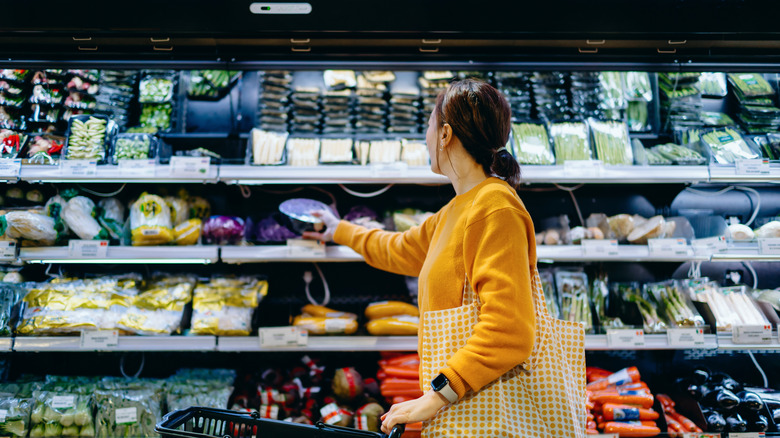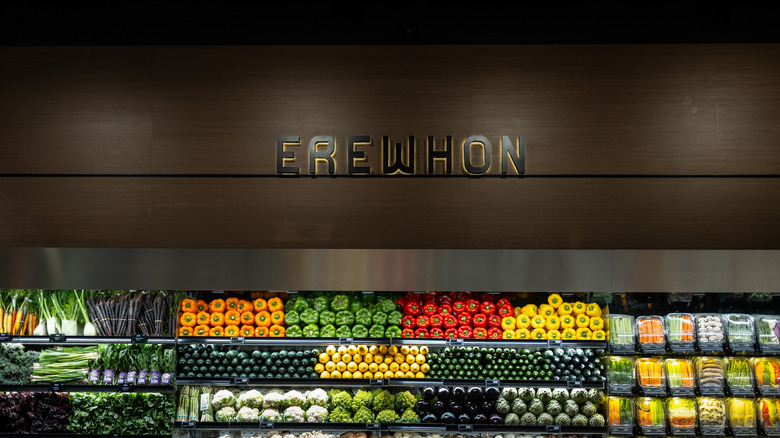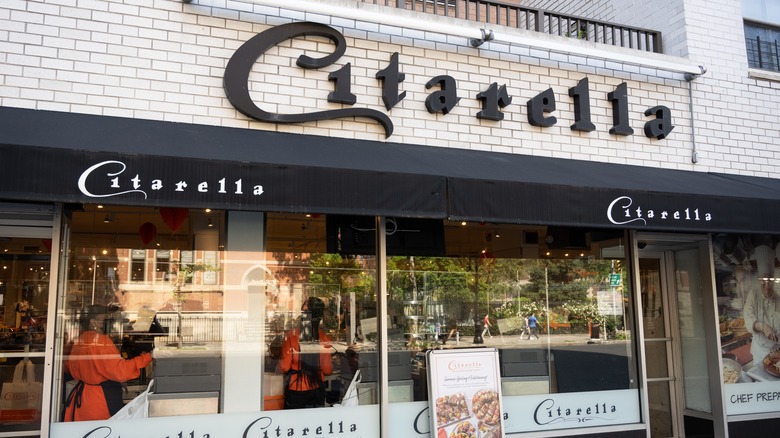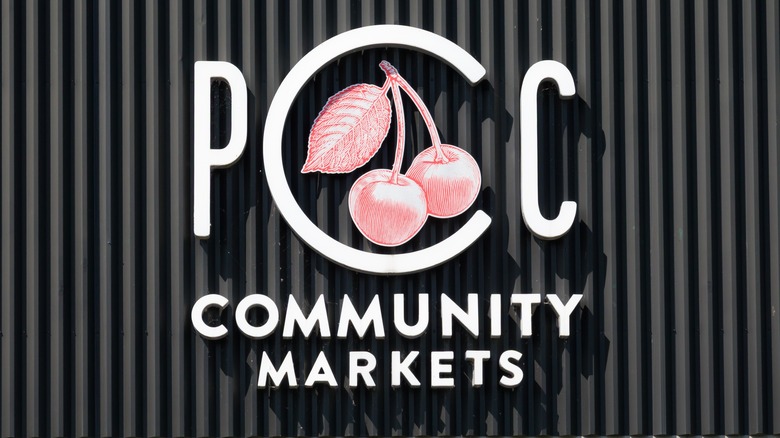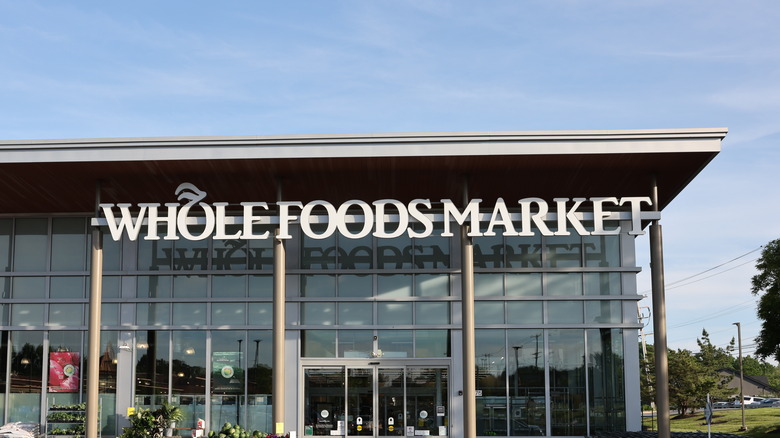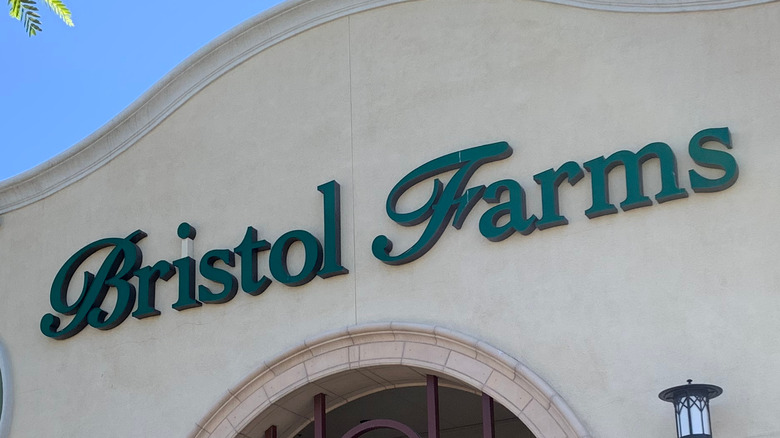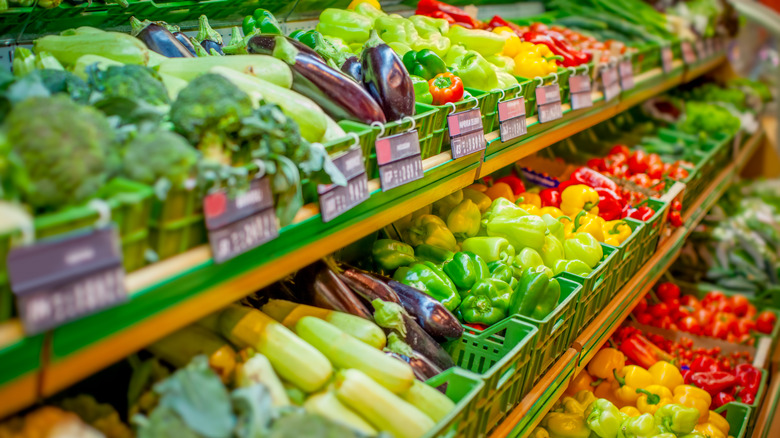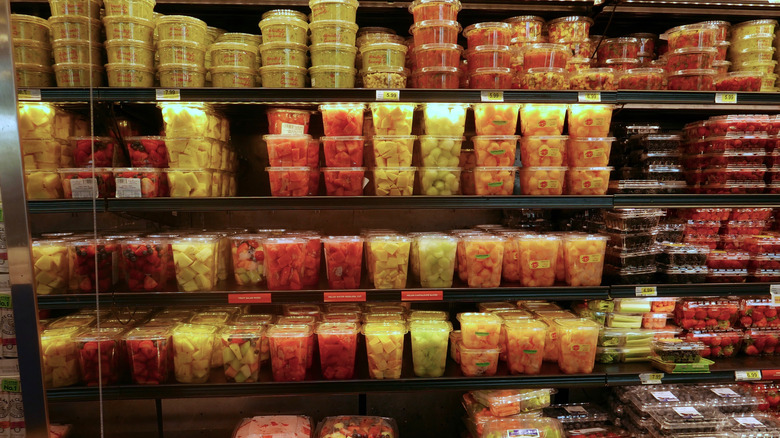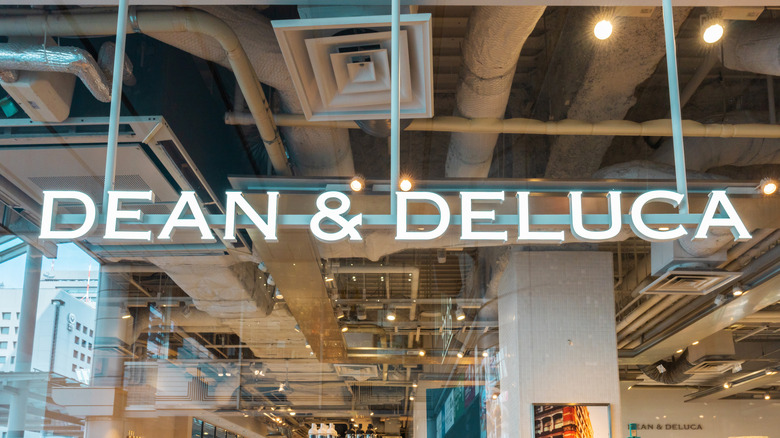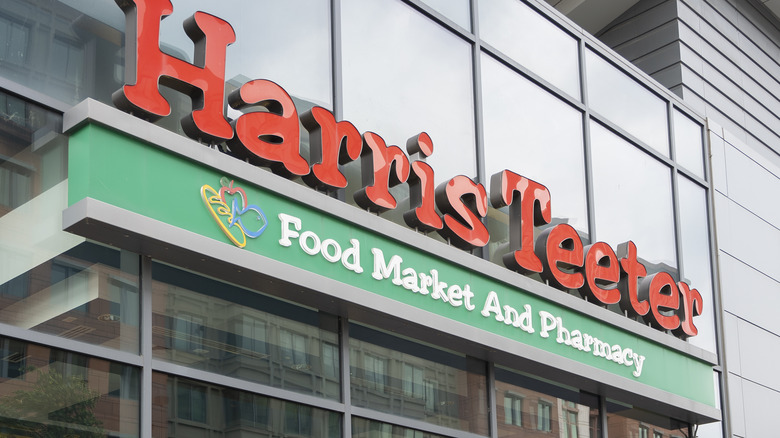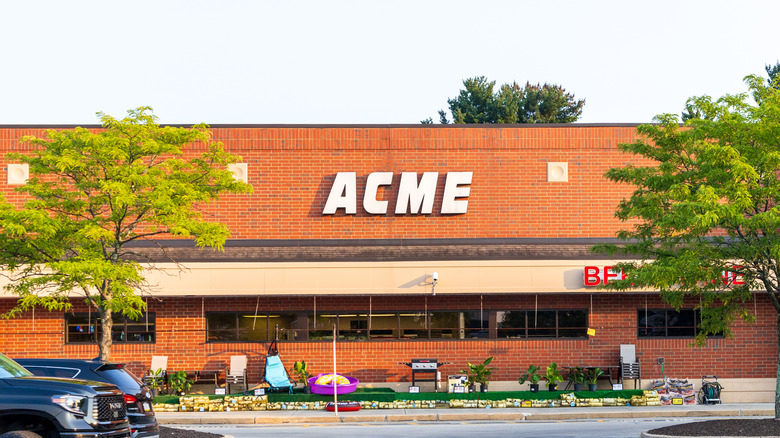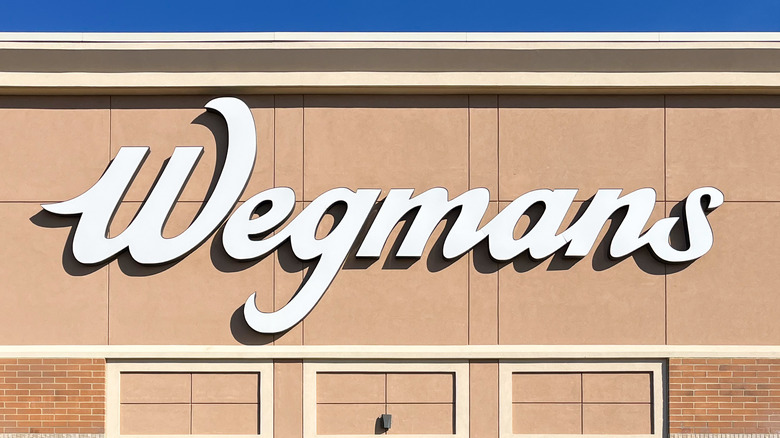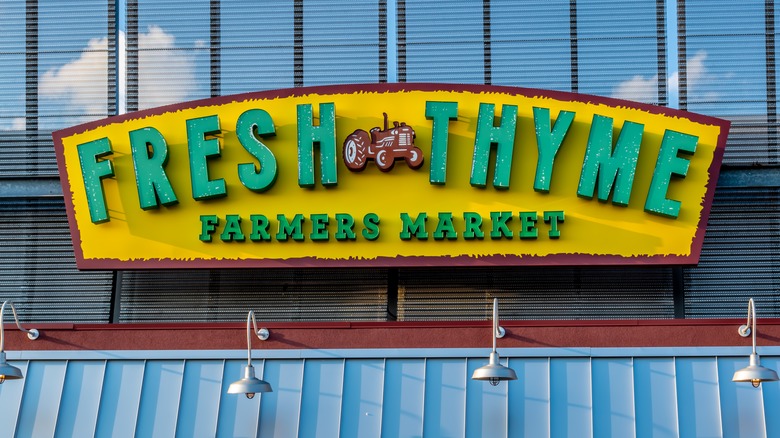America's Most Overpriced Grocery Store Chains
With the cost of living continuing to rise, more and more people are looking to avoid spending more than they have to on groceries. Top-of-the-line brand names might offer more specialized and premium options, but for many, the price tags simply can't be justified. Even when employing cost-saving strategies, the average U.S. household spends over $500 per month on groceries alone. That's nearly one-third of the standard rent of $1,640, highlighting a notable rise in food costs.
There are plenty of macroeconomic and even geopolitical factors — such as tariffs, trade wars, supply chain disruptions, and inflation — that impact the cost of all groceries, no matter where they're sold. However, many grocery stores have built-in premiums based on their reputation or selection. If you're looking to curb your monthly expenses and avoid those jaw-dropping grocery bills, being diligent about where you shop is crucial. Focusing on the cheapest stores is one of many grocery shopping strategies that save you money – and if that's your strategy, avoid these chains.
Erewhon
Erewhon is dubbed "the most expensive grocery store in America" by Crown Financial Ministries. Based in Los Angeles, Erewhon has exported its unique blend of premier groceries, trendy wellness products, and stylish merchandise to several countries around the world. The in-person shopping experience is nearly as crisp, clean, and ergonomic as the virtual version. Shoppers are treated to modern stores with carefully designed displays featuring various Erewhon products. Unlike other stores — such as Costco or Kroger — that have cheaper branded alternatives, Erewhon's self-made products are more expensive than the norm.
For example, a private-label grocery bag from this high-end store costs a staggering $138. You'll see the same price hike on a simple 24-pack of Erewhon sparkling water for $80. Beyond simple daily groceries, this Californian chain charges significantly for other deluxe services. You can become a member, complete with valet parking, for $200 annually. A membership at the Erewhon cafe is $100, offering coffee products, smoothies, and even prepared meals. At these prices, you're officially upper class if you pay for these services.
Citarella
Citarella is a local New York grocery chain specializing in fresh fish and seafood. Fittingly, the popular Big Apple brand started as a local restaurant out of the Upper West Side of Manhattan. The seafood joint operated for over 70 years before transitioning to a high-end grocer. Since opening in 1983, Citarella has maintained a relatively small footprint, with only seven locations and a liquor store concentrated in the NYC area. This tight coverage is a reflection of the premium chain's expensive items. The average big city socialite is the perfect target audience for the costly grocery store.
Although Citarella continues to focus on fish and seafood, the higher-than-average costs of these items seem to have seeped into other areas of the store. For example, you'll have to cough up $11.49 for a half-gallon of milk. That would work out to over $20 for a gallon. A dozen eggs would set you back $12.99. Planning to make some chicken cordon bleu or chicken enchiladas? Get ready for a $17.49 price tag on that bag of boneless chicken breasts. At these prices, it's surprising that Citarella stays in business, but the beloved NYC chain still sees a lot of fanfare.
PCC Community Market
You might not have ever heard of it, but PCC Community Market has a few superlatives to its name. According to the official website, the chain is the country's largest grocery cooperative owned by customers. In other words, the entire company is owned by the people who shop there rather than a private investor or national corporation. PCC Community Market has focused on "health and wellness" both in the produce it offers and the building materials it uses.
In 2020, the Seattle-based coop became the very first grocer to receive the Living Building Challenge (LBC) certification, one of the most stringent designations for environmentally friendly buildings. This obvious commitment to sustainability and premium-grade products comes with higher price tags — a deal that many customers in the Seattle area have no trouble making. For instance, some customers report paying up to $7 for six ounces of organic raspberries. When you consider that's one of the Costco food products you can buy for $5 or less, PCC Community Market's price is really put into perspective. Surely, frozen goods are more reasonably priced, right? Not so fast. Shoppers have also mentioned seeing frozen burger patties for $20.
Whole Foods
Whole Foods is the standard-bearer of high-end grocery shopping. A report by Investopedia found that Whole Foods is much costlier than standard chains. On average, Whole Foods is around 12% more expensive than national supermarket brands, and that's down from 20% at its height. Amazon's purchase of Whole Foods in 2017 actually saw the organic grocer become more affordable, with Jeff Bezos focused on making the chain accessible to a wider audience.
In a recent Business Insider piece, a private chef decided to test his weekly grocery budget at Whole Foods. He found staples such as pasta, chicken, and tofu to be nearly twice as expensive as normal groceries. The chef's standard $60 grocery budget didn't last long at Whole Foods, owing to the chain's overpriced products, relative to where you might normally shop. If you do decide to shop here, make sure to avoid the mistakes that cost you money at Whole Foods.
Bristol Farms
Bristol Farms concentrates heavily in Southern California, especially Los Angeles, which explains the chain's exorbitant prices. The elite brand is famed for its superior shopping experience and professional display configurations. At times, it can feel like you're shopping in an art gallery instead of a supermarket. This premium shopping experience is backed up by high-quality products. Whether you hate cooking or your schedule is busy, you'll love the hot bar that serves ready-to-eat meals. For a normal grocery store run, you'll find everything you need, along with some specialty products that help the brand stand out. The name Bristol Farms invokes local, healthy, and customer-oriented, which is precisely what the chain is going for.
Shoppers would expect produce and meats at Bristol Farms to exceed the standard price, but even kitchen staples are surprisingly costly. For instance, according to the company's website, a 16-oz container of brown sugar is $5.69. And, a five-pound bag of organic wheat flour is a whopping $12.19. Even a 16-oz box of spaghetti could make you do a double-take at $4.79. The costs rise considerably when you move away from the standard items toward more specialty goods — the products in which Bristol Farms specializes.
Natural Grocers
With a name like Natural Grocers, budget-conscious shoppers are on alert immediately. A focus on organic vs non-organic groceries doesn't automatically mean the former is more expensive, but that's the case with this Colorado-centric chain. Launched with only a few hundred dollars in 1955, shoppers can expect to complete their daily errands with a bill for around that amount. The founders were far ahead of the national frenzy around health and wellness, explaining the chain's current success. Natural Grocers commits itself to offering customers non-GMO and 100% organic fruits and vegetables, pasture-raised dairy products, and meats without any hormones or antibiotics.
These exclusive offerings come with steep prices. In fact, Natural Grocers doesn't display its prices online unless you're signed up to the site. However, the premium supermarket does post some meal deals online, offering a glimpse into their pricing. For example, a "Grilled Chicken & Veggies" offer prices a whole chicken at $11.99, an 18-ounce bottle of BBQ sauce for $5.55, and grilling rub for $5.19. While these prices won't break the bank, they're certainly above what you'd expect to pay at a reasonably priced chain, especially when you consider that these are advertised as deals.
Kings Food Market
Kings Food Market is a supermarket name befitting of royalty. And, that's precisely who the luxurious grocery chain serves. Kings Food Market is a staple among New Jersey and Connecticut elites. Shoppers say it's like a more expensive version of Whole Foods, which is pricey to begin with. Launched in 1936, this boutique shop offers a select choice of products, focusing on premium meats, fresh fish, and local fruits and vegetables. The celebrated chain goes a step further by offering a wide selection of international cheeses and other foreign products. On-the-go professionals and busy families love the chef-prepped meals.
Shoppers expect to see a surge in prices for specialty items, but Kings Food Market hikes its standard offerings, too. A single avocado was recently listed for a wallet-crushing $4.29, dramatically higher than the national average of $1.43. Similarly pricey, a cooked chicken is $9.99. Kings Food Market makes a note to offer customers many coupons, but even these routine deals would struggle to account for the chain's elevated prices on average.
Gelson's Fresh Market
Gelson's Fresh Market started like many national supermarket chains: A humble family grocery in the mid-1900s. The bootstrapped business venture has blossomed into a premier grocer with dozens of locations throughout Southern California. With such a large footprint in one of the most expensive areas of the country, it's no surprise that Gelson's prices tend to hover above the norm. Shoppers may be agast to see a dozen eggs selling for $10.99 or a gallon of milk priced at $6.99. Higher than most of the expensive grocers on this list, Gelson's charges $14.99 for a pound of chicken.
Apart from standard groceries, Gelson's has made an effort to expand into other offerings, capitalizing on shifting customer expectations of what constitutes a grocer. Now, customers can get chef-prepared meals for the road, professional catering for events, and floral arrangements for different occasions. Gelson's even holds regular in-store events such as wine tasting, beer specials, taco Tuesdays, and more.
Central Market
Central Market may sound generic, but its selection is anything but standard fare. The Texas-focused chain is known for its choice selection of top-tier produce and specialized goods. Shoppers have no trouble finding the more run-of-the-mill items, although Central Market is focused on more exclusive options. Beyond mere groceries, you can participate in a variety of activities at multiple locations, such as food or drink tastings, cooking courses, and other activities or demonstrations. As the name suggests, Central Market strives to be a culinary epicenter where people flock for all their food-related needs, not simply groceries.
While these extras help the chain stand out from the competition, the above-average prices turn many frugal shoppers off. Many of Central Market's cartons of 12 eggs are priced at $7 or $8 on the company's website, well above the national benchmark. A half-gallon of its self-branded organic whole milk is $4.12, costing U.S. households over $8 for a gallon. Another favorite among Central Market enthusiasts — and another defining cost of the expensive chain — is its bakery, where a bunch of freshly-made goods can be bought on a daily basis. Unfortunately, these handmade breads and pastries cost a pretty penny.
Dean & Deluca
Dean & Deluca might sound like an expensive clothing brand, but it's a high-end gourmet grocer founded in the stylish SoHo neighborhood of New York City. This upscale emporium offers specialized foods at eye-watering prices, which might help explain some of its financial struggles. Its brick-and-mortar locations have suffered several setbacks over the past few years, leading to a bankruptcy filing in 2020. While the deluxe supermarket maintains a few physical locations, it's built a strong virtual presence. Furthermore, new investors are staging a comeback with international locations planned.
Despite leaner operations, Dean & Deluca still makes the list of America's most overpriced grocery chains. The brand's celebrated babkas — a sweet bread common among Jewish cultures in Eastern Europe — cost $28 according to the company's website. As enticing as a simple batch of cookies with chocolate and vanilla icing looks, the Dean & Deluca premium of $35 can turn off those taste bud motivators. Something as simple and typically low-cost as espresso grounds can still eat into your grocery budget at this boutique. Regardless of the type, you can expect to pay around $18 for a bag of coffee. The tea isn't much better from an affordability standpoint, costing between $15 and $25 for a moderate amount.
Harris Teeter
Harris Teeter is a one-stop shop offering groceries, household items, and pharmaceutical goods, yet this convenience comes at a cost. According to GoBankingRates, the Southeastern supermarket is the second-most expensive grocer in the entire country. That's saying a lot, given the steep competition of America's most overpriced grocery store chains. Harris Teeter has grown to 261 locations across seven states, earning a reputation for top-shelf products and fresh groceries.
As with several other expensive chains, Harris Teeter offers several specialties, such as a deli known for prime cuts, seafood with various fresh options, and a bakery chock-full of handmade selections. As you might have guessed, shoppers aren't spared the expensive price tags when going for standard items, either. A half gallon of organic whole milk can reach up to $6.49 on its website, far outpacing the national standard. The quintessential grocery store rotisserie chicken is also pricier than normal, standing at $7.99. However, the store sometimes runs a deal where shoppers can get it for $5, more in line with the country's average.
Acme Markets
Acme Markets sounds like something out of a Sunday morning cartoon, but the prices are no joke. Shoppers can expect to pay $7.29 for 12 eggs — considerably higher than the national average cost of about $5, according to SoFi. While cheaper than some other stores on this list of overpriced grocery chains, Acme sells a gallon of milk for $4.99. Zippia places the average national price at about $3. That might seem like a small difference for a single visit to the grocery store, but it adds up considerably over time.
As is seemingly standard with opulent grocery stores, Acme advertises itself as a holistic grocer offering wellness and pharmaceutical goods along with standard groceries. Since its founding in 1937, the high-end chain has focused on providing unbeatable customer service and maintaining a curated selection of quality products. Although competitive pricing is also listed as a target goal for the company, many other, more affordable chains are more competitive in that area.
Wegmans
Wegman is known for offering a smorgasbord of delectable fares from around the world, but the premium quality comes at a premium cost. With people-pleasers like ready-made meals by professional chefs and handmade sushi to-go, the above-average expense is to be expected. From meager beginnings in 1916 to today, Wegman's has expanded to more than 110 locations, employing more than 53,000 employees, per the company's website. Part of those high operating costs is paid for by a surcharge on groceries.
Despite advertising affordable items, many shoppers have noted its offerings to be slightly more than what they pay at other stores. For instance, a single chicken breast goes for just shy of $9 — roughly the equivalent of two Costco rotisserie chickens. A dozen eggs — a universal metric of grocery prices — is set at $7.39, well above what you'll pay on average. You'll find reasonable prices mixed in with more expensive items, but Wegman's is still costlier on average.
Fresh Thyme
Fresh Thyme is a popular organic grocer in the Midwest, with a stated mission of enhancing the way "communities eat" by providing "healthy food." The supermarket blurs the line between upscale boutique and neighborhood grocer, but its prices are still on the higher end. Fresh Thyme hand-selects all of its produce and products, ensuring the best quality for its customers. It focuses heavily on organic and "all-natural" foods, including regional favorites and local gems.
A study conducted by Checkbook.org found that Fresh Thyme was considerably costlier than some more affordable grocery brand names. More specifically, the report highlighted that the merchant was 9% more expensive than Walmart and Target. That might not seem like a lot, but it adds up significantly over time. Consider that the average U.S. household spends $418 weekly on groceries. Over the course of a year, Fresh Thyme would set back an American family by $450.
